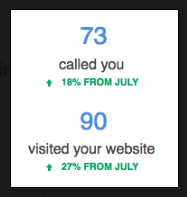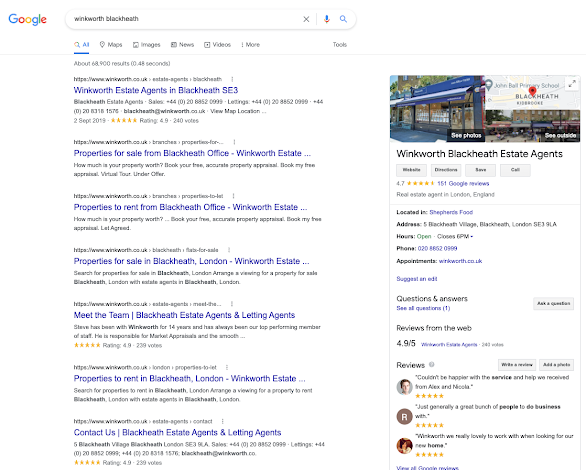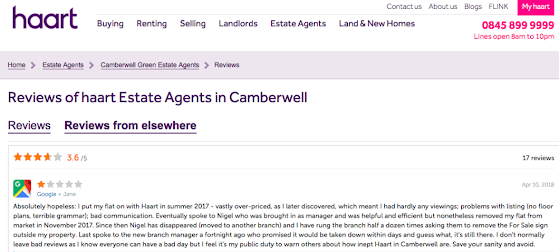In spite of our fifteen+ years of experience working - full time - with reviews, our exhaustive knowledge of Google and the likes of Trustpilot, Yelp, Feefo, Reviews.io, TripAdvisor, Reputation.com and the rest, and - even more puzzling - the amazing case histories (link in the first paragraph of 'Do reviews drive revenue?' below) we still, frequently enough to have us write this article, encounter responses along the lines of 'No, we are doing [insert current ineffective or often downright illegal strategy] and we're going to stick with it.'
We know it's only human to be defensive when you have invested time, energy and resources into a solution, even if that solution can be proven to be deficient (remember just how many people persisted in buying Vauxhalls or Lancias back in the day when the whole world - from friends to the motoring press - was telling them, time and again, that they would be driving a worthless rust-bucket in a few years' time?).
The role of this article is to calmly work through the solutions that don't work or are likely to endanger a business's reputation - or are just plain illegal, so you can make a rational and reasoned decision for your business.
First: do reviews drive revenue?
If you have already experienced the power of positive reviews to drive up clicks and calls then skip this section and begin again at 'Benefits are measurable'.
With well over 90% of consumers consulting reviews before they purchase a product or service, reviews - and professional review management - are not a 'cost'. They are most definitely a profit-generator - for those businesses that are prepared to put in the effort and overcome the 'fear'.
A business scoring over 4.5 on Google with over 100 reviews will attract more clicks and calls than a business scoring less with fewer reviews. Read these case histories and you will see exactly what we mean. Great reviews and great scores lead directly to...
- increases in enquiries, both through a business's website (providing reviews are hosted and shown there) and through Google. This can easily be quantified by reference to the business's Google My Business monthly report which will show you the uplift in clicks and phone calls through Google search.
- greatly enhanced SEO: we are constantly asked 'How does XYZ HelpHound client consistently appear at or near the top in any given Google search?' The answer is complex and shrouded in mystery (it's Google's 'Coke formula'), but Google tells us that it gives significant SEO credit to businesses that host reviews - proper reviews, not testimonials - on their own websites.
- great marketing ammunition: here's a recent post by a client and here's a link to their reviews on their website:
Benefits that are measurable
Cost - as we all know - is only relevant when viewed in the context of benefit. Fortunately, Google sends every business on the planet a monthly report that tells it exactly how many enquiries - click-throughs and phone calls - it has had as a result of Google searches in the last month. Again, here's a complete article on results here, but this screenshot of a business's uplift in both clicks and calls after joining HelpHound really says it all...
18 per cent more calls and 27% more clicks for less than £200 a month (much less if you have multiple branches)?
Now on to the various solutions available to businesses...
Google - direct
Great. Spot on. Google reviews are it. Way ahead of anyone else's. Unless your business is vulnerable to the occasional inaccurate or misleading review. The business world is divided into three categories...
- those that are impervious to online reviews: the likes of your mobile phone provider, utility companies or banks. They'll carry on trading irrespective. Here's an example we all know of...
- those where the business - often selling products as opposed to services - recognises that it needs to score 4 out of 5, but that's enough. Online retail is a good example: if someone is buying a shirt and it scores 4 out or 5 they will still buy it. Less than 4 and they will probably look for a better rated product.
- Professional services, where consumers are looking for as close to perfection as is reasonable. We know, from hard experience over many years, that a Google score of over 4.5 is crucial for the likes of medical, financial, legal or 'large ticket' services - estate agency being another obvious example. Please read the following review carefully...
Note for those still thinking 'negative reviews can't harm my business': The five figure award was made because the firm of solicitors were able to provide concrete proof of declines in both telephone enquiries and clicks though to their website subsequent to the publication of the critical review on Trustpilot sufficient to convince a judge sitting in an English court of the fall in revenue it had experienced. Given that Trustpilot reviews are only visible to those actively searching for them and Google reviews are seen by just about anyone searching for the business in question we don't feel that we are exaggerating in saying that a negative review on Goggle is going to do at least ten times the damage that a similar review on Trustpilot has been proven - to a court's satisfaction - to have been done here. The full story is here.
Breaking the law
This is the biggie: most businesses don't understand the UK law as it relates and applies to reviews and those that do misunderstand the consequences of breaching it.
The law
Is quite straightforward: the following three actions are expressly forbidden...
- selectively inviting customers to write a review. Any business proactively inviting reviews must be able to prove that any customer is able to write a review at any time of their choosing
- showing selected reviews on the business's website
- 'gating': using a mechanism - which might be a 'customer survey' or another less visible review site - to establish which customers are most likely to write a positive review and then inviting only those to do so
The consequences
- the most obvious: fine + sanction + publicity (and anyone who thinks the CMA is toothless best read the sorry tale of the three estate agents and their £600,000 fine). An article highlighting the rules and our advice can be found here
- the less obvious, but potentially just as harmful: the fact that any of the three illegal activities listed above will be obvious to any savvy competitor; they are then almost certain to use that information in competitive pitches 'Yes, their reviews are wonderful aren't they? But we're bound to tell you they are that way because they are illegally acquired/filtered. Do you really want to be dealing with a business that flouts the law?'
- and in the case of gating: this is expressly against Google's Terms of Service as well. Google will simply delete all the reviews of any business it considers to be gating. And there will be no appeal
Review sites
This article was published here on our blog four years ago. And it wasn't the first time we warned businesses against using, let alone paying for, a review site. The review site gets all your lovely client data in exchange for what? Giving you a star rating that's far less credible or influential than a free Google one.
Yet we see them everywhere. How so? Simply because they predate Google reviews (there would have been no review sites if Google hadn't been so late to see the power of reviews). Also: they have salesforces who are trained to maximise the wafer-thin benefits of these sites and minimise the power of Google reviews. But just perform any simple search - on your own business or any other - and what do you see?
Google reviews. End of.
So: if your business falls into the first two categories you just need a Google widget on your website and then invite customers to post directly to Google.
If you are a professional or service business you will need a moderated but Google-focussed system that gets reviews - your own - to your own website and then get as many as possible of those across to Google. Like this...
240 here, then...
...151 to Google (note the extracts appearing in the Google rich snippets at bottom right and the original reviews hosted on their own website showing alongside their organic listing at top left). Then the all important local search...
...where they lead both the Google 3-pack and natural (organic) search.
Review aggregators
What a great idea. What could possibly go wrong? For clarity, review aggregators scour the web for any reviews of your business and then present them on your website for potential customers to see. Fine, until you realise that there's no safety net. No way of moderating what is being written or said before it's published front and centre. That's fine if you are an online retailer and people are looking for you to score 4 out of 5 before they order your shirts or socks (one review site was even founded by such a business) but potentially hugely damaging for a professional business providing easily misunderstood complex services to clients or patients.
And another...
...any thought of time or effort vanishes into thin air.
In conclusion...
If your business falls into any of the following categories:
- Yet to actively engage with online reviews - from fear of the consequences or just because you have been meaning to but just haven't got around to it.
- Engaged in the past but had a negative experience - a harmful review on Google or any other site, for example.
- Already inviting clients* to post direct to Google but are aware of the risks that this entails.
- Already inviting clients* to post to a review site, but concerned that you may be missing out on the power and credibility of Google reviews.
- Cherry-picking or gating - sometimes euphemistically called 'selecting' and 'pre-qualifying' but nonetheless illegal - to ensure your online reputation is protected (don't worry, you're not the only ones, but you will sleep a whole lot easier once you have adopted a legally compliant solution).















No comments:
Post a Comment
HelpHound is all about feedback, so please feel free to comment here...